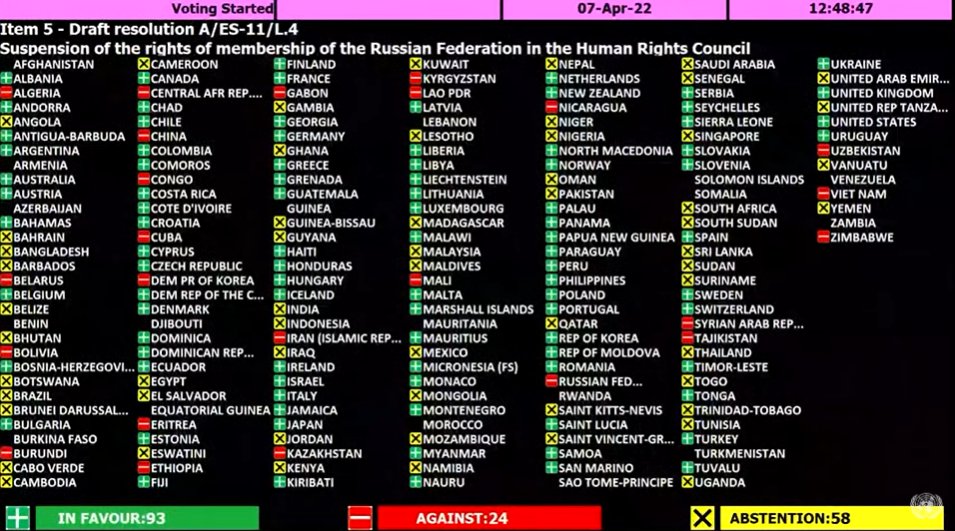UNITED NATIONS, (Reuters) – The United Nations General Assembly today suspended Russia from the U.N. Human Rights Council over reports of “gross and systematic violations and abuses of human rights” by invading Russian troops in Ukraine.
The U.S.-led push garnered 93 votes in favour, while 24 countries voted no and 58 countries abstained. A two-thirds majority of voting members in the 193-member General Assembly in New York – abstentions do not count – was needed to suspend Russia from the 47-member Geneva-based Human Rights Council.
(Guyana abstained in the vote and CARICOM was once again divided on a foreign policy issue.)
Suspensions are rare. Libya was suspended in 2011 because of violence against protesters by forces loyal to then-leader Muammar Gaddafi.
It was the third resolution adopted by the 193-member General Assembly since Russia invaded neighbouring Ukraine on Feb. 24. The two previous General Assembly resolutions denouncing Russia were adopted with 141 and 140 votes in favor.
The resolution adopted today expresses “grave concern at the ongoing human rights and humanitarian crisis in Ukraine,” particularly at reports of rights abuses by Russia.
Russia says it is carrying out a “special military operation” that aims to destroy Ukraine’s military infrastructure and denies attacking civilians. Ukraine and allies say Moscow invaded without provocation.
Russia had warned countries that a yes vote or abstention will be viewed as an “unfriendly gesture” with consequences for bilateral ties, according to a note seen by Reuters.
‘PULLING A TRIGGER’
Russia was in its second year of a three-year term on the Geneva-based council, which cannot make legally binding decisions. Its decisions send important political messages, however, and it can authorize investigations.
Moscow is one of the most vocal members on the council and its suspension bars it from speaking and voting, officials say, although its diplomats could still attend debates. “They would probably still try to influence the Council through proxies,” said a Geneva-based diplomat.
Last month the council opened an investigation into allegations of rights violations, including possible war crimes, in Ukraine since Russia’s attack.
Speaking before the vote, Ukraine’s U.N. Ambassador Sergiy Kyslytsya said a yes vote would “save the Human Rights Council and many lives around the world and in Ukraine,” but a no vote was “pulling a trigger, and means a red dot on the screen – red as the blood of the innocent lives lost.”
The United States announced it would seek Russia’s suspension after Ukraine accused Russian troops of killing hundreds of civilians in the town of Bucha.
Russia’s deputy U.N. Ambassador Gennady Kuzmin said now was not the time for “theatrical performances” and accused Western countries and allies of trying to “destroy existing human rights architecture.”
“We reject the untruthful allegations against us based on staged events and widely circulated fakes,” Kuzmin told the General Assembly before the vote, defending Russia’s record as a Human Rights Council member.
After abstaining on the previous two General Assembly votes, Russia’s partner China opposed the resolution Thursday.
“Such a hasty move at the General Assembly, which forces countries to choose sides, will aggravate the division among member states, intensify the confrontation between the parties concerned – it is like adding fuel to the fire,” China’s U.N. Ambassador Zhang Jun said before the vote.






